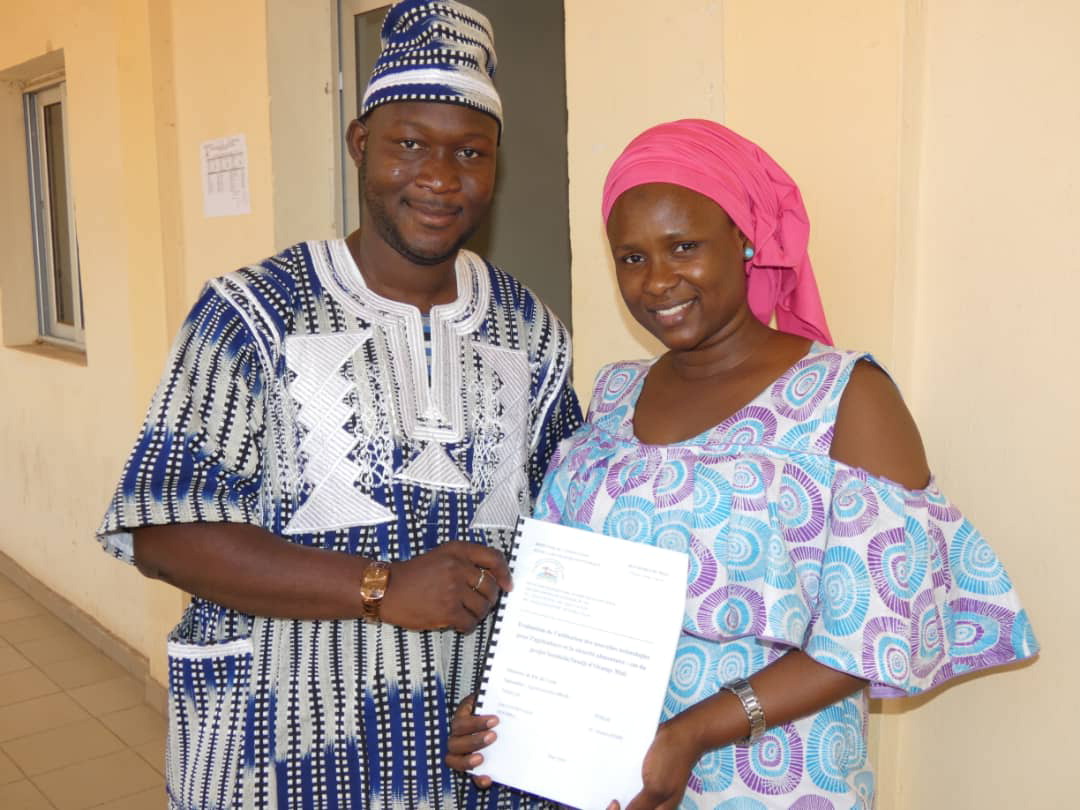|
Cycle 6 (2017 Deadline)
Evaluation study of the use of digital technologies for agriculture and food security in Mali
PI: Amadou Sidibé, sidibe.amadouy@gmail.com, Institute Politechnique Rural Katibougou
U.S. Partner: Laura Schmitt Olabisi, Michigan State University
Project Dates: December 2017-October 2019
Project Overview
 | | PEER project students. Photo courtesy of Dr. Sidibe | Research on technology in a developing world context, particularly in Africa, is sparse, with studies on technology adoption and diffusion focusing mainly on descriptive statistics. However, such statistics do not offer much insight into the process of technology adoption or productivity growth. This project will contribute to theoretical and methodological perspectives on the processes of innovation and technology development in the context of Mali. On one side, the research will contribute to understanding not only what digital technologies fit into which socioeconomic context but also what enabling conditions are required to allow their inclusive use across scales. On the other side, the NSF-funded project headed by the U.S. partner is aimed at studying the drivers of food insecurity in West Africa using a participatory modeling approach. Stakeholders at national and local levels are involved in the modeling process and in identifying drivers of food security and coping mechanisms for food insecurity. Digital technologies are being proposed in Mali as partial solutions to food insecurity. For example, mobile phones are proposed to guide farmer decision-making through expert advice on the issues of concern farmers may have, including the right period for sowing crops and market information like the price and demand for different crops. Digital technologies are also used through the combination of mobile phones and remote sensing to provide extension services, to improve agriculture statistics compilation, and to help define and document land rights, thereby reducing conflict and improving tenure security. The NSF-supported project will incorporate data collected under this PEER project to determine how effective these technologies are under different conditions. This PEER project will also yield important insights into how farmers alter their decisions after receiving enhanced information. This will help to refine how the agent-based models under the U.S. partner’s project work.
Final Summary of Project Activities
The main conclusion, as highlighted in a paper under review at the time of the final report, is that the development of new technology is not a panacea but the beginning of a long process of matching the intention of designers and the need and desire of users. The uptake and use of technology are therefore a collective performance built around an iterative process of trials, errors, and redesign. The technology diffusion and intake could make a leapfrog if a feedback mechanism between the design and the use is clearly established at the onset and integrated into the diffusion and the adoption process. It is essential to consider that the technology is designed with embodied intentions that need to engage in open discussions and accommodate the needs, aspirations, and desires of the users driven by specific socioeconomic conditions different from the designers ’ones and in which the technology is introduced. In short, the adaptation of technology to users’ conditions and aspirations is essential for technology intake.
One positive outcome of their research is that it allowed different stakeholders to jointly discuss the issues of concern around the use of digital technologies. This raised the awareness difference in expectation between stakeholders. For instance, the local telephone company learned of the need to enlarge the network coverage and take additional measures for widespread use of the services they provide including adapting the services to socioeconomic conditions of users in terms cost, as well as, the nature and the quality of the service. Their feedback events pointed to the need for the telephone company to consider the way they communicate with farmers the users of technologies.
Publications
Laura Schmitt Olabisi and Amadou Sidibé. 2023. Observations from a system dynamics modeling field school in Mali. System Dynamics Review, January 2023. https://doi.org/10.1002/sdr.1726
Laura Schmitt Olabisi, Amadou Sidibé,·Elsie Assan,·Jelili Adebiyi,·Edmond Totin, and Mary Thompson‑Hall. 2022. Building consensus and increasing self-efficacy: participatory scenarios as a tool for developing food security solutions in West Africa. Regional Environmental Change 22: 21. https://doi.org/10.1007/s10113-022-01893-4
Udita Sanga, Amadou Sidibé, and Laura Schmitt Olabisi. 2021. Dynamic pathways of barriers and opportunities for food security and climate adaptation in Southern Mali. World Development 148: 105663. https://doi.org/10.1016/j.worlddev.2021.105663
Amadou Sidibé, Laura Schmitt Olabisi, Hawa Doumbia, Kadiatou Touré, and Cris Auguste Niamba. Barriers and enablers of the use of digital technologies for sustainable agricultural development and food security: Learning from cases in Mali. Elementa Science of the Anthropocene 9: 1. https://doi.org/10.1525/elementa.2020.00106
Back to PEER Cycle 6 Grant Recipients
|
|
|
|




